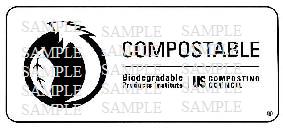Something I’m seeing on some so-called “green alternatives” products is a little seal with the words “BPI Certified”. I’d never heard of it before so I decided to find out what BPI is and why I should care if something is certified by them. It looks like this:

First thing I discovered is that if you go looking for “BPI Certified” in google, you’re going to come up with a bunch of construction hits. Apparently people can become “BPI Certified” in the construction industry (I didn’t dig deep enough to find out what it actually certifies because it’s not what I’m researching today).
Well, that’s not it. So I tried other keywords and eventually found my way to the Biodegradable Products Institute. Their logo matches the seal I was seeing so this must be what I’m looking for. BPI is, in plain English, a group of manufacturers, academics and government groups who promote biodegradable materials.
Biodegradable. Now that’s a word that’s been misused for the last few decades. In theory, “biodegradable” means that the item will entirely break down when properly disposed of. Sadly, there isn’t really a usable legally defined meaning for “break down properly” and a lot of products that claim to be biodegradable leave chemical residue behind. It’s one of those terms like “Lite” that have been co-opted by marketing to sell products in a way that is just this side of criminally deceptive. BPI claims that’s why they’ve creating this certification. Products that they give a certification to have been tested to be truly biodegradable according to rigidly defined criteria. I don’t know enough about the subject yet to say how rigorous those criteria are; I suggest you check out their site and make up your own mind on that account.
Biodegradable and compostable have a lot of overlap but are not entirely the same thing. It looks like part of their certification is making sure the items are fully compostable. Here’s the catch — they mean compostable in a commercial facility, not in your backyard compost heap. You should refer to the manufacturer of any given product before assuming that it’s compostable in your own bin.
From a compost vs landfill standpoint, if you don’t have a commercial/government composting facility that will accept these items, there’s not a _lot_ of advantage to the compostable plastics, because they aren’t generally recycled in most communities. Many communities that accept them in the recycle bin still remove plastics 3-7 to the landfill. Now, the biodegradable is still the better option in a landfill, just not by the leaps and bounds that you might think from how it’s named. If you’re getting a certified compostable plastic, then when it does eventually break down, it’s less toxic than its non-compostable brothers. That alone makes it worth choosing where it’s available, if you’re sure it’s going to end up in a landfill either way. But most landfills do not reach the heats required to cause the compostable plastics to break down (same reason you can’t just throw them in your own compost heap), so they sit in the landfill taking up space just like any other plastic.
Another thing to remember is that this group includes some of the really big resin corporations, like Dow and DuPont, who have a vested interest in playing up how much better their compostable plastics are, because they can charge more for them because environmental responsibility is big now. That doesn’t invalidate the certification in any way — I’m pretty happy that someone’s testing to see what’s left after a product breaks down. But it _does_ influence how they report and educate people and you should remember that.
Another reason to look for this certification is that most compostable plastics are made from non-petroleum sources, such as corn starch. That by itself is a great reason to look for the logo. Petroleum-based plastics are high polluters from the point where you drill an oil well to the thousands of years in landfill. Even recycling petroleum-based plastics, while better for the environment than landfilling them, is not a non-polluting enterprise.
Even with this certification though, I still have to come to the conclusion that unless your community accepts compostable plastics for disposal in a commercial composting facility, non-plastic alternatives are still always your best choice. If recycling of Plastics 1 and 2 are available, you’ll need to investigate how the recycling is handled and what happens to the recycled plastic to decide which plastic option is the lesser of two evils. When I started looking into this I expected it to be much more cut and dried. I expected, honestly, for the compostable to _always_ be the better alternative. Turns out that’s not always the case.
Now I’m beginning to truly comprehend the underlying reason environmental responsibility is so difficult for the majority of people. Human nature likes tidy pigeonholes with concrete always-right answers and the more research I do, the more I come up with answers that start out “It depends.” But that’s real life, eh? Nothing’s ever really tidy or simple. We just like to fool ourselves into thinking it is so we don’t have to think too hard about it.
For my part, I’ll be trying to bring my own ceramic mug instead of the plastic and plastic-lined cups in the cafeteria at work now, even though they’ve switched to BPI Certified compostables for both. So far as I can tell, Milwaukee has no good way to deal with them, so I’ve been guiltily throwing them in the trash, consoling myself with the thought that when it does finally breakdown at least it’s not toxic… now I just need to find a really big ceramic mug…